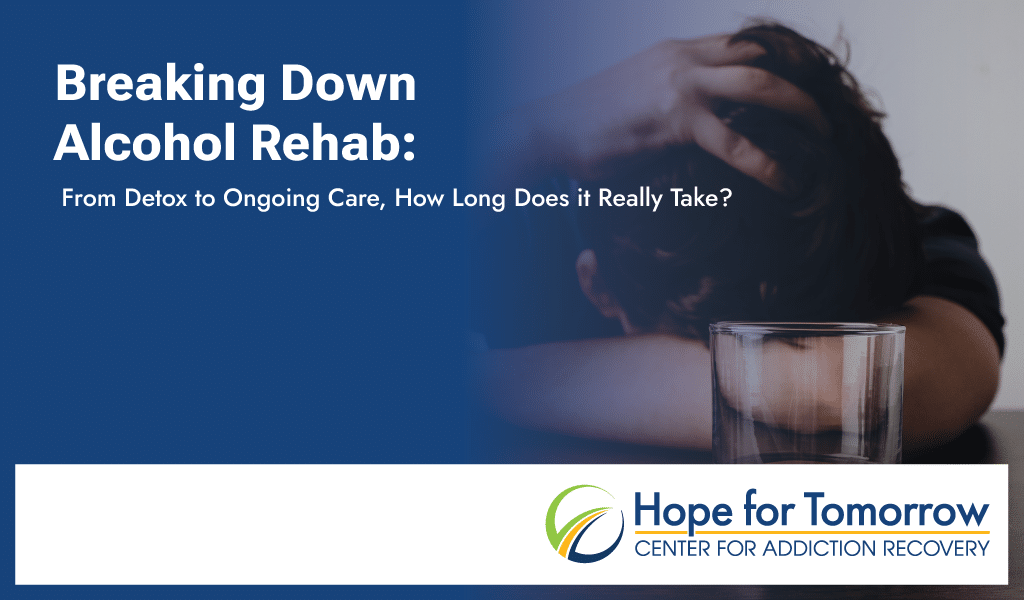

Alcohol use disorder touches families all across West Virginia, often quietly and behind closed doors. The CDC estimates that more than 28,000 years of potential life are lost each year due to excessive alcohol use, in just West Virginia alone – a staggering reminder of how deeply this impacts our local communities. At Hope for Tomorrow, we believe that recovery starts with understanding and support.
From detox to long-term outpatient support, every step plays a role in rebuilding health, stability, and connection. So, how long does alcohol rehab take? In this article, we will discuss this question and provide estimated timelines.
Recovery from alcohol use disorder isn’t a one-size-fits-all process. It’s a journey composed of stages that build upon each other over time. The length of each stage can vary depending on the severity of the addiction, personal health history, and the individual’s support system, but understanding the general timeline can help remove some of the uncertainty.
Days 1-7: The first step to alcohol use disorder recovery is detoxification, which typically lasts about a week. During this time, the body clears itself of alcohol and begins healing physically. Because withdrawal symptoms can range from uncomfortable to dangerous, detox is often medically supervised for safety and comfort.
Days 7-30: After detox, many individuals transition into inpatient care, where they receive round-the-clock support and structure. This stage focuses on understanding addiction triggers, developing coping skills, and beginning to heal from the underlying emotional or psychological issues that contributed to alcohol use.
8-12 Weeks: For those stepping down from inpatient rehab – or those whose needs can be safely met outside of a residential setting – intensive outpatient programming (IOP) offers a flexible but focused level of care. Clients attend several sessions per week and continue to build the skills necessary for lasting recovery.
Ongoing and Continuing Care: Recovery doesn’t stop when the structured program ends. Many people benefit from ongoing therapy, support groups, or check-ins through outpatient or continuing care programs. This phase may last months or even years, providing accountability, encouragement, and a sense of community through long-term recovery.
Whether it takes a few months or longer, the timeline of alcohol addiction treatment reflects a deep truth: recovery is possible, and each step forward matters.

Alcohol detox is the first step toward recovery. For most people, detox lasts between 3 and 7 days, though it can vary depending on the length and severity of alcohol use, overall health, and any co-occurring conditions.
During this time, the body is working hard to clear alcohol from the system, which can lead to a range of withdrawal symptoms. These can begin as early as 6 hours after the last drink and may peak around day 2 or 3. Symptoms can include anxiety, nausea, insomnia, sweating, and – in more serious cases – seizures or delirium tremens (DTs).
This is why medical supervision during detox is critical. At Hope for Tomorrow, our team provides 24/7 monitoring, emotional support, and (when necessary), medication to help manage symptoms safely. Because alcohol withdrawal can be dangerous without proper care, professional detox ensures both safety and comfort during this vulnerable period.
While detox may be short-term, it sets the foundation for the rest of the recovery process and opens the door to healing.
Inpatient alcohol rehab typically lasts 30, 60, or 90 days, depending on each person’s needs, progress, and history with alcohol use. This level of care provides a structured, substance-free environment where individuals can fully focus on their recovery – without outside distractions or triggers.
During inpatient rehab, clients participate in daily therapy sessions, group counseling, and holistic wellness activities that support both their physical healing and emotional journey. It’s also a time to begin rebuilding routines, coping strategies, and self-worth.
Longer stays often provide more time to address underlying mental health conditions or trauma, which can be essential to a person’s lasting recovery.
Outpatient alcohol rehab offers flexibility for individuals seeking treatment while maintaining daily responsibilities. The duration varies based on the program type, individual progress, and specific needs. At Hope for Tomorrow, we provide a couple of outpatient options:
Each of these programs is tailored to meet the unique needs of our patients, ensuring a personalized approach to recovery.
Rehab is often just the beginning of a much longer journey. While detox and treatment lay the foundation for sobriety, true recovery continues long after formal programming ends. Continuing care is the bridge between intensive support and long-term stability. It’s the part of recovery that happens in everyday life.
Continuing care is proven to help in successful long-term recovery. However, not every path will look the same. Some may benefit from regular therapy sessions to work through lingering triggers or co-occurring mental health concerns. Others may stay engaged through alumni groups, peer support meetings, or check-ins with their care team.
At Hope for Tomorrow, continuing care is woven into every step of our treatment process. We help clients build a realistic plan for life after rehab. One that includes structure, connection, and tools to navigate challenges as they arise. Whether someone is newly sober or has been in recovery for years, having a strong support system and the willingness to reach out can make all the difference.

If you or a loved one is seeking compassionate and effective alcohol detox, Hope for Tomorrow provides medically supervised detoxification to ensure safety and comfort throughout the process. Our alcoholism rehab programs offer individualized treatment plans developed by experienced clinicians, tailored to each person’s unique journey toward recovery.
With a focus on dignity and respect, we create a supportive environment that fosters lasting healing. Call us today at 877-679-8162 to take the first step toward a healthier future.
Treatment today for a brighter tomorrow.